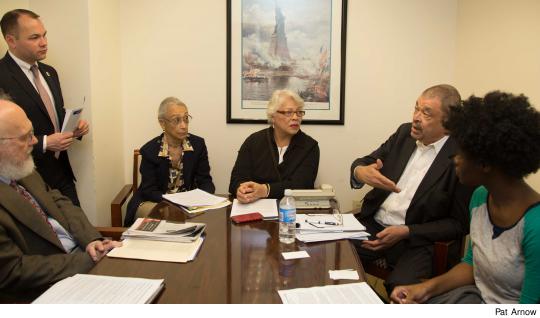 |
With the June 30 municipal budget deadline approaching, the PSC asked the City of New York to fund CUNY in a way “worthy of a progressive city with a progressive leadership.”
Testifying at a City Council hearing on March 6, PSC First Vice President Steve London welcomed Mayor Bill de Blasio’s support for increased CUNY funding in last year’s budget and in the mayor’s preliminary executive budget proposal for the coming fiscal year.
Looking Ahead
London urged the council to “move toward fulfilling the aspiration for CUNY that Mayor de Blasio has articulated: to ultimately increase City funding for the University by $150 million per year.” Reaching that goal, he said, will require the council’s active support: “The City Council can put a down payment on that investment by negotiating with the mayor for operating funds to CUNY over and above the mayor’s proposed increase,” he told the council.
As an example of why those funds are needed, London cited CUNY’s successful ASAP Initiative (Accelerated Study in Associate Programs), which President Obama cited as a national model. “With an additional investment of $3,900 per full-time equivalent student (FTE) above the standard community college allocations, ASAP has resources to provide smaller classes, sharply focused counseling and mentorship, free tuition and other critical supports for students,” London said. As a result, “graduation rates can be dramatically raised. Of the most recent cohort, 56% graduated from community college within three years – a result that far outpaces national averages.”
A particular priority for the union in this year’s City budget is support for collective bargaining between the PSC and CUNY administration (see sidebar). In London’s testimony, he called on Council members and the mayor to back “the goal of reaching a contract that allows the University to offer the best possible education.”
City Council
This year the union’s grassroots lobbying efforts on the City budget are taking a new tack. In past years, a large effort on a single day around the beginning of May, dubbed “CUNY at the Council,” was central to the union’s City budget campaign. Dozens of meetings with Council members and key staff were held, and the large scale of the event helped draw attention to CUNY’s needs and the PSC’s budget priorities. But the focus on a single day makes it harder to engage a large number of members in the kind of targeted approach that the PSC took with the State budget in 2015, with focused follow-up that allowed union activists to track legislators’ stances over time and prioritize attention to those who still need to be moved.
This year the PSC’s grassroots lobbying on the City budget will emphasize local meetings with Council members in their home districts during late April and throughout the month of May. “Constituents speaking directly with their Council representatives at home is the most effective tool we have for strengthening the Council’s stance on CUNY funding,” said London. “If CUNY funding is important to you, we need you to set aside the time to join other PSC members in meeting with your Council member. Right now is when your presence can have the most impact.”
To attend a district meeting with your Council member, or just to find out more, call the PSC’s Amanda Magalhaes at 212-354-1252, or contact her by email at [email protected].
Change in Direction
“Mayor de Blasio and the City Council have started an important change of direction for CUNY funding,” London told Council members. He noted that New York City’s operating budget for the current fiscal year (2014-2015) boosted funding for CUNY’s community colleges by $14.7 million, expanding the ASAP Initiative and programs in science, technology, engineering and math (STEM), and added $10.9 million in new merit scholarships for CUNY students.
But while the mayor’s preliminary budget proposal for the 2015-2016 fiscal year “increases community college funding by another $13 million for the same purposes,” London noted, it relies on the Council “to continue to fund the City Council Merit Scholarship and other CUNY-focused initiatives.” The PSC therefore urged Council members to maintain their support, which helps to fund CUNY’s Center for Puerto Rican Studies, its Dominican Studies Institute, the Council’s new Merit Scholarship program and more.
The PSC also sought council support for its “One City Fellows” proposal, which would fund 100 new full-time faculty lines as a first installment toward a total of 1,000 new full-time faculty and staff positions. “No other single investment could do more to ensure the future success of CUNY’s students,” London told Council members, with important impacts in “increasing opportunity and reducing inequality in our city.” The added lines “would mean smaller classes, more course offerings, and workloads that would support greater mentorship to students,” he emphasized. And this new hiring “could be used by CUNY to create full-time opportunities for qualified long-serving adjuncts and to hire black and Latino personnel to address the disparity between the ethnic composition of the faculty and the students they serve.”
The union also gave its support to CUNY’s capital budget request, addressing critical repairs needed at many campuses as well as support for new facilities.

